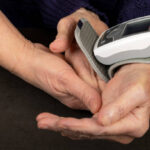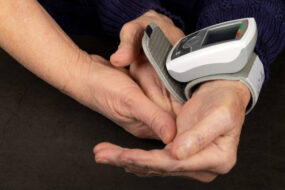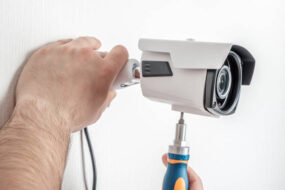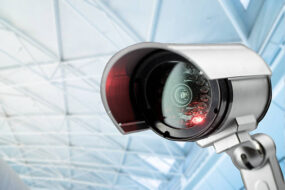Wearable health trackers:
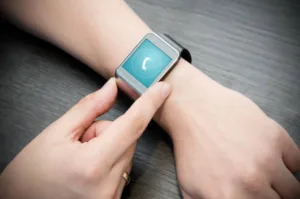
The world of wearable health technology is booming. From fitness bands that count steps to smartwatches that track sleep, these devices have become an increasingly popular way for people to monitor their health and activity levels. But what’s next for wearables? We’re on the cusp of a revolution, with a new generation of trackers emerging that promise to go far beyond counting steps.
Beyond the Basics: A Holistic Approach to Wearable Health Trackers
The first generation of wearables focused primarily on fitness metrics like steps taken, calories burned, and distance travelled. While valuable for exercise enthusiasts, these metrics offer a limited picture of overall health. The next generation of wearables is expanding its reach, offering a more holistic view of your well-being.
Here’s a glimpse into what these advanced trackers can do:
1. Advanced Heart Monitoring: Many new wearables are equipped with sophisticated sensors that can continuously monitor your heart rate, rhythm, and even blood pressure variations. This can be crucial for early detection of heart problems, allowing for timely intervention and improved long-term health outcomes.
2. The Sleep Tracking Revolution: Sleep is essential for physical and mental well-being. Next-generation trackers go beyond simply measuring sleep duration. They can analyse your sleep stages (light, deep, and REM), identify sleep disturbances like sleep apnea, and even offer personalised sleep improvement recommendations.
3. Stress Management Insights: Chronic stress can have a significant impact on your overall health. Advanced wearables can track physiological responses to stress, such as heart rate variability and skin conductance. This data can help you identify stress triggers and develop strategies for better stress management.
4. Blood Oxygen Monitoring: Pulse oximeters are becoming a common feature in next-generation wearables. These sensors measure the amount of oxygen in your blood, which can be helpful for athletes monitoring performance or individuals with respiratory conditions.
5. Personalised Health Coaching: The next wave of wearables is moving beyond data collection towards actionable insights and personalised coaching. Imagine a wearable that analyses your sleep patterns, activity levels, and stress response, then provides tailored recommendations for improving your well-being.
6. Biometric Identification: Wearables are evolving into secure biometric identification tools. Imagine using your wearable to unlock your phone or make contactless payments—all with the convenience and security of your unique fingerprint or scan.
Read More: Exploring Wearable Ultrasound Imaging Technology
Benefits of Next-Generation Wearable Health Trackers:

The benefits of these advanced wearables extend far beyond bragging rights about your daily step count. Here’s what you stand to gain:
1. Proactive Health Management: By providing a more comprehensive picture of your health, these wearables empower you to take a proactive approach to your well-being. Imagine receiving alerts for potential health concerns and taking preventative measures before issues escalate.
2. Personalised Health Insights: These wearables go beyond generic data; they personalise your experience. Imagine receiving insights tailored to your specific health goals, sleep patterns, and activity levels.
3. Improved Motivation and Engagement: Advanced wearables offer an engaging way to track your progress towards your health goals. Seeing real-time data and personalised feedback can significantly boost your motivation to stay on track.
4. Early Detection of Health Issues: Continuous monitoring capabilities can potentially identify early signs of health problems, such as heart arrhythmias or sleep apnea, allowing for timely diagnosis and treatment.
5. Streamlined Healthcare Experience: Wearables can play a valuable role in connecting you with healthcare professionals. Imagine sharing your wearable data with your doctor to have a more informed discussion about your health.
Read More: Exploring the Smart Life-Compatible Switches and Plugs
The Future of Wearable Health Technology:
The development of wearable health technology is moving quickly. Here are some exciting possibilities on the horizon:
1. Integration with Artificial Intelligence (AI): Imagine AI-powered wearables that can analyse your health data in real-time and offer personalised recommendations and interventions.
2. Researchers are actively investigating the possibility of non-invasive blood glucose monitoring through wearables, a breakthrough for diabetics.
3. Mental Health Monitoring: Wearables can help monitor mental health by tracking sleep patterns, activity levels, and physiological responses to stress.
4. Wearables allow healthcare providers to remotely monitor patients with chronic conditions, improving care management and reducing hospital readmission rates.
Considerations and Challenges of Next-Generation Wearables:

While the potential of next-generation wearables is exciting, there are some considerations:
1. Data Privacy and Security: As wearables collect increasingly detailed health data, ensuring data privacy and security is crucial. Users should be confident that their sensitive health information is protected.
2. Accuracy and Reliability: The accuracy and reliability of data collected by wearables are critical. Ongoing research is necessary to ensure the validity of the data and the insights derived from it.
3. Battery Life: Often, advanced features come at the expense of battery life. Balancing functionality with extended battery life will be an ongoing challenge for wearable developers.
How to Choose the Right Wearable
With the ever-expanding market of wearable health trackers, choosing the right one can be overwhelming. Here are some tips to guide you:
1. Identify your needs. Consider what aspects of your health you want to focus on. Are you primarily interested in fitness tracking, sleep monitoring, or a more comprehensive approach?
2. Research Features: Once you understand your needs, investigate different wearable options and compare their features. Look for devices that offer the functionalities most important to you.
3. User Comfort: Wearables are meant to be worn all day, so comfort is paramount. Choose a device that is lightweight, breathable, and fits well.
4. Compatibility: Ensure the wearable you choose is compatible with your smartphone and operating system.
Investigate the data privacy practices of the wearable manufacturer. Look for companies with a strong track record of data security and user privacy.
Read More: Unveiling Smart Life-Compatible Cameras and Sensors
Conclusion:
The next generation of wearable health trackers promises a future where taking charge of your health is easier than ever. With advanced monitoring capabilities, personalised insights, and the potential for integration with healthcare systems, these innovative devices empower you to make informed decisions about your well-being.
As wearable technology continues to evolve, we can expect even more exciting advancements that transform how we monitor, manage, and ultimately improve our health. So embrace the next generation of wearables and embark on a journey towards a healthier, more empowered you!

